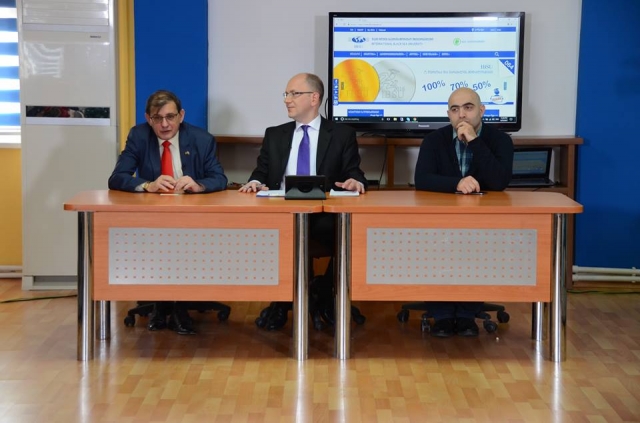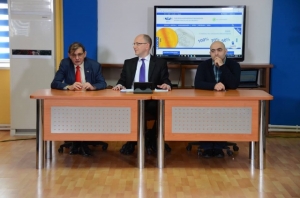Romanian Ambassador on Navy, NATO and Russian Relations
Georgia is offering NATO the chance to deploy its navy in Poti port. If realized, this will dramatically change the power balance in the Black Sea basin and pose a geopolitical threat to Georgia – stories like these, reported by Russian media over the last month, made Georgians scratch their collective heads – on one hand, we’d really, really love that to happen, and the recent decision at the NATO Defense Ministerial in February fueled our optimism further. After all, the Alliance had announced its plans to bolster Black Sea security. On the other, more sensible, hand, though, the story checked all the boxes for potential Russian disinformation and neither Georgian media nor government rushed in to explain how things really stood. IF this comes true, this basically means NATO can circumvent the 1936 Montreux Convention which explicitly prohibits the stationing of non-Black Sea country warships of over 15000 tonnage for more than 21 days in Black Sea waters. To clarify, GEORGIA TODAY and Panorama Talk Show contacted the Ambassador of Romania in Georgia, His Excellency Radu Horumba, to talk about the existing situation. The interview was made possible courtesy of the International Black Sea University, students of which eagerly joined the interview as its firsthand audience and supplied many a challenging question to the Ambassador, who opened the discussion by congratulating Georgia with the recent EU visa liberalization.
“I would like to use this opportunity to congratulate the Georgian people and the Government of Georgia with the entry into force of the EU-Georgia visa liberalization agreement. This is a fantastic advantage and I felt it personally when visa liberalization was allowed for us in 2001, before we joined the EU as a full-fledged member state 10 years ago. For many of us, it was a great opportunity to better know Europe, European citizens and other places. Georgia’s visa liberalization is a milestone, not the end of the road, for Georgia’s European aspirations. There will be different dynamics of implementing reforms, and some will not be easy, speaking from our own experience. These dynamics need further support from the entire Georgian population.
-The NATO’s Black Sea announcement made this region somewhat less predictable – how do you see the current power balance in the Black Sea basin?
Since 2014, following the illegal annexation by Russia of the Crimean peninsula, we are witnessing permanent, constant degradation of security and stability in the Black Sea area. This is the reaction that all NATO members had towards what Russia was and is doing, and not only in the Black Sea, but also in the Baltic Sea, because we have three NATO-member Baltic countries which, unlike Romania, Bulgaria, and Turkey, have a direct border with Russia. And we see military build-up in this area as well. So this is why I’m saying that the reaction of NATO is gradual and adapted in accordance to the situation on the ground.
- Given our rather limited naval potential, what windows for partnership exist between Georgia and NATO, and between Georgia and Romania? What can Georgians offer?
I would approach this question from another key – one of them being surely political. Naval access to the Black Sea is regulated by the 1936 Montreux Convention of Turkey, which provides that no warships of the navies other than those of Black Sea countries can be permanently stationed in the Black Sea. There are also limits of staying time and tonnage for these ships, which have to be observed. The Convention it is also an essential international document for Turkey and its sovereignty on the Straits between the Black Sea and the Mediterranean Sea.
Second element - Why do we need a naval presence in the Black Sea? Because we need stability. And stability is important for Georgia, for the transport and energy corridors that cross Georgia. There is an increase of commodities trade and economic connections between Europe and the Far East, especially China; there is interest in developing transport corridors for freight, and the shortest route passes through Georgia. From the Georgian ports, cargo goes to other Black Sea ports and further on, to Central and Western Europe. We are also interested in that, because Constanta is the largest port in the Black Sea and is connected directly to the Danube. The energy corridors matter, too. Most of the pipelines coming from the Caspian Sea to Europe and the Mediterranean Sea cross Georgia- the South Caucasus gas pipeline will be continued by the so-called TANAP pipeline to the border of Turkey and further to Europe. There is also the oil Baku-Tbilisi-Ceyhan pipeline, which has been operating for several years now.
- Unrealistic as it may sound, if NATO were to build a military base in Poti, wouldn’t this action provoke the Kremlin?
There are no NATO military bases in Poti and it is not planned to have such a military base. I agree, it would potentially raise tensions in the region, and as I said before, the NATO reaction is an adaptive response to what Russia does. It is not something we want to overreact to, so let’s keep it real: NATO is reacting, and Georgia is also coordinating its reactions according to what Russia does in the region.
- What’s the state of the AGRI (Azerbaijan-Georgia-Romania Interconnector) project that is supposed to deliver liquefied natural gas from Azerbaijan to Georgia and then, via the Black Sea, to Romania and other European states?
This is why we are interested in having a stable situation in Georgia and the Black Sea, in order to ensure and guarantee unhindered freedom of trade movement and navigation. As for the AGRI project, it’s not just an issue of strategic thinking; it’s first of all an issue of commercial interest. For the moment, we have discussed the feasibility study that was done – and this discussion continues at the governmental level. We’ll soon see the continuation. Also, keep in mind that the price of oil, to which the gas price is connected, is lower today, compared to years ago. Therefore, some of the calculations have to be revised to see if it is still feasible. You have to look at the developments in the region and look very carefully into the capacity of the suppliers and the demand of the buyers.
- Eight years since the Bucharest NATO Summit, at which Georgia was given a promise of eventual NATO membership, and one major conflict later, what role do you think the promise plays in relations between Georgia and Russia?
2008 was indeed a hugely important moment, with NATO deciding to continue its open-doors policy for countries wishing to join. Of course, this was probably one of the reasons why warning lights went off for some in Moscow. Why? Because not everybody in the “near abroad” was happy to remain under the influence of a certain regime which was historically too connected, by its ideology and attitude, to an old regime, which was a prison for people like Georgians, and not just them. So, this invitation might have been one of the reasons behind what happened in August 2008. However, the decision made at the Bucharest NATO Summit still stands. At the Warsaw NATO Summit, the policy of open doors was stated and re-stated again. And to conclude, let me bring in the case of Montenegro. It was one of the old candidates, and it was received as a NATO member. The system works.
Vazha Tavberidze












